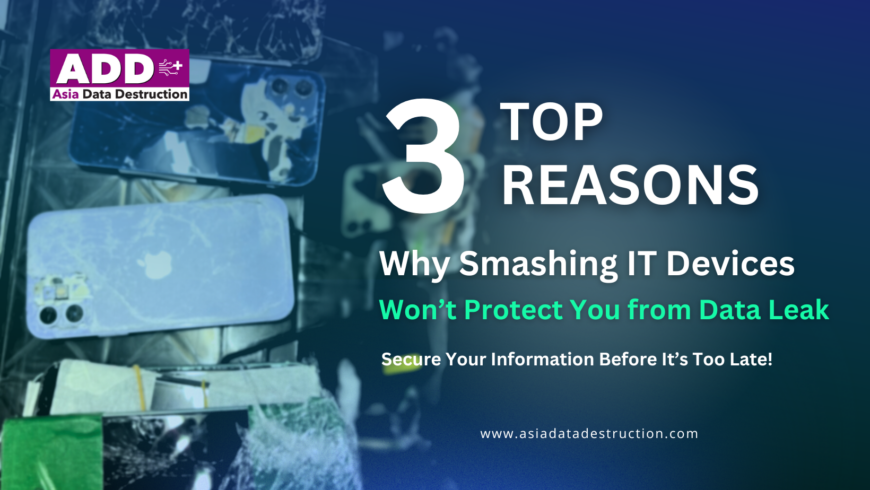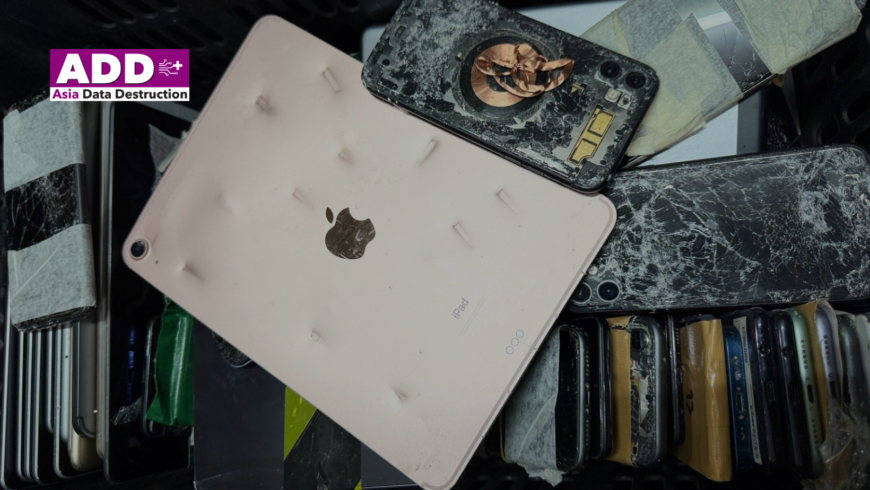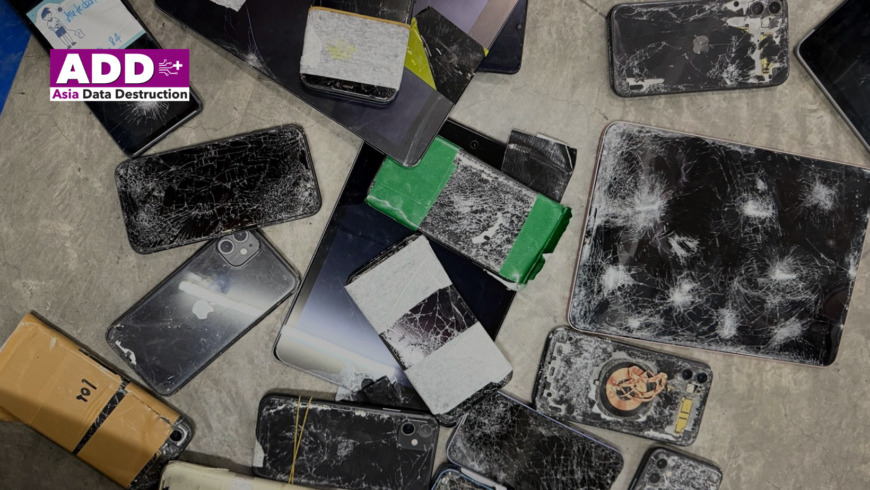
Top 3 Reasons Why Smashing Devices Won’t Protect You from Data Leak
In today’s world, where personal and corporate data is increasingly vulnerable, simply smashing an old phone, laptop, or data-storing device isn’t enough to guarantee your sensitive information is erased forever, leading to potential data leaks. Whether it’s a cracked smartphone screen or a shattered laptop, valuable data remains stored deep within the internal components of these devices—data that can still be accessed by skilled individuals, contributing to a data leak.
According to the 2024 Verizon Data Breach Investigations Report, human errors, including poor data management during device disposal, contribute to 68% of data leaks. Moreover, vulnerabilities in unpatched systems and improper disposal methods are often exploited by cybercriminals, accounting for a significant portion of ransomware attacks. In total, 32% of breaches in 2023 were due to ransomware, which often targeted improperly secured or discarded devices, leading to data Leaks
Here’s Why Your Data Isn’t Safe from a Data Leak
1. Data Is Stored in Internal Chips and Memory
Devices such as phones, laptops, tablets, and even external hard drives store data in memory chips and internal storage. While a cracked screen or a few smashed pieces may render the device unusable for you, the data remains intact and recoverable, making it vulnerable to data leaks. Skilled data recovery experts or worse, cybercriminals can retrieve valuable and sensitive information, even from physically damaged devices. This includes personal data like passwords, financial records, private communications, and corporate data like proprietary documents, client information, or trade secrets, potentially leading to a data leak.
2. Physical Damage Isn’t Enough
Simply breaking a device isn’t a guarantee that your data is safe. For example, the hard drive in a laptop or the NAND chips in a smartphone can still retain their contents, even if the device is shattered, increasing the risk of a data leak. Specialized software and hardware tools can extract data from seemingly destroyed devices. Physical destruction, when done incorrectly, can leave enough of the internal components intact for someone to reconstruct the data, putting your privacy and security at risk, ultimately resulting in a data leak.
3. Improper Disposal Leads to Identity Theft and Corporate Espionage
When old devices are not properly disposed of or securely wiped, the risk of identity theft or corporate espionage significantly increases due to potential data leaks. Hackers or data thieves can salvage data from disposed electronics to gain access to personal accounts, confidential business documents, or intellectual property. This kind of data leak can cause devastating financial losses, reputational damage, or legal issues. Companies are particularly vulnerable, as sensitive client or employee information, corporate strategies, and proprietary technology can be stolen if not handled with care.
Key Statistics on Data Leak from Improper Disposal
- 68% of Used Devices Still Contain Data
According to a study by Blancco Technology Group and Ontrack, 68% of used devices purchased on the secondhand market still contained personal and confidential data, leading to potential data leaks. This includes sensitive information like financial records, personal identities, and corporate documents. Even though these devices were resold, many had not undergone proper data erasure, leaving the data vulnerable to recovery by anyone with basic skills, resulting in a data leak.
- 40% of Recycled Devices Contain Personal Data
A UK-based study conducted by the Information Commissioner’s Office (ICO) found that 40% of hard drives resold or recycled contained residual personal data, contributing to the risk of a data leak. This occurred despite the belief that the data had been erased. Simple reformatting or deleting files does not sufficiently remove data, making improper disposal practices a major security concern leading to data leaks.
- 20-25% of Businesses Suffer Data Breaches from Improper Disposal
Research by the Ponemon Institute revealed that 20-25% of businesses experienced data leaks due to improper disposal of IT assets. The lack of secure data destruction processes, combined with poor data management policies, exposes companies to risks of data leaks, identity theft, and corporate espionage.
- Data Recovery Tools Can Extract Data from 80-90% of Improperly Wiped Devices
A report by Kroll Ontrack found that 80-90% of devices that had not been wiped using professional-grade tools still contained recoverable data, which can lead to data leaks. Even if physical destruction had been attempted (e.g., breaking the device), the internal storage components like NAND flash memory or hard drive platters can often still be accessed using data recovery tools, causing a data leak.

Implications of Improper Device Disposal Can Lead to a Data Leak
- Identity Theft and Fraud: Improper destruction of devices can expose personal data, such as Social Security numbers, banking information, and login credentials, leading to identity theft, fraud, and data leaks. The 2023 Verizon Data Breach Investigations Report found that 85% of data breaches involve some form of human error, including improper data disposal.
- Corporate Espionage: For businesses, failure to securely destroy end-of-life IT assets can lead to leaks of proprietary information, intellectual property, or confidential business strategies, leaving organizations vulnerable to corporate espionage and data leaks.
- Non-compliance Fines: Data protection regulations like the GDPR, HIPAA, and CCPA impose hefty fines for failure to securely dispose of data, especially if sensitive information is leaked. Non-compliance often results in fines due to data leaks, reaching up to €20 million or 4% of global revenue under GDPR.
How to Ensure Complete Data Security to Prevent Data Leak
When it comes to disposing of old devices, it’s essential to adopt a comprehensive approach that ensures no trace of data is left behind, preventing data leaks. Here’s how you can protect yourself and your business
- Use Professional Data Wiping Tools Before Disposal
A crucial step in protecting your data is to use specialized data-wiping tools to securely erase all the contents of your devices. These tools go beyond simple deletion; they overwrite the data multiple times to ensure it’s irretrievable. Many people are unaware that deleting files or performing a factory reset doesn’t permanently remove data. It can still be recovered using sophisticated tools. Using industry-standard software like DoD 5220.22-M, NIST 800-88, or Blancco to wipe data ensures that it’s permanently destroyed. - Combine Physical Destruction with Certified Data Erasure Services
For maximum security, it’s best to combine data wiping with physical destruction. While wiping erases data at a software level, physical destruction ensures the device itself is no longer functional. However, physical destruction should be done using professional equipment such as hard drive shredders or degaussers to render the device completely unusable. Certified IT Asset Disposal (ITAD) companies can handle this process securely and issue certificates that guarantee the data has been completely destroyed, providing peace of mind and legal proof of compliance. - Partner with Professional IT Asset Disposal (ITAD) Services
One of the most reliable ways to secure your data is by partnering with an IT Asset Disposal (ITAD) company that specializes in secure data destruction. These companies follow strict industry standards and guidelines to ensure data is destroyed beyond recovery. They handle the entire process, from secure logistics and transport of devices to data wiping, physical destruction, and providing certified proof that the destruction has been carried out in accordance with laws and regulations like GDPR, HIPAA, and local privacy acts.
Conclusion
Merely smashing your old devices is insufficient to ensure the complete safety of your sensitive data. The reality is that data leaks can still occur as data remains intact within the internal components, making it recoverable by skilled individuals, including cybercriminals. With alarming statistics revealing that 68% of used devices still contain data and that improper disposal can lead to significant breaches, it is crucial to take a comprehensive approach to data security to avoid data leaks.
To effectively protect yourself and your organization from data leaks, identity theft, corporate espionage, and legal repercussions, utilize professional data-wiping tools that overwrite data multiple times, and consider combining these methods with certified physical destruction. Partnering with specialized IT Asset Disposal (ITAD) services ensures that both data erasure and destruction are handled according to industry standards, providing legal proof of compliance with regulations such as GDPR and HIPAA. By adopting these measures, you can safeguard your personal and corporate data, reducing the risks associated with improper disposal and ensuring your sensitive information is truly erased for good, eliminating the threat of data leaks.

Why Choose Asia Data Destruction (ADD)?
At Asia Data Destruction (ADD), we understand the critical importance of protecting sensitive data. We offer complete data destruction services that ensure no trace of your data is left behind. Whether it’s an old smartphone, laptop, or large data center equipment, we use industry-leading standards to safeguard your data throughout its end-of-life process.
Our services include:
- Data Erasure: We use advanced wiping software to ensure your data is permanently deleted and cannot be recovered by any means.
- Physical Destruction: We employ cutting-edge techniques to physically destroy data-storing devices, such as shredding, crushing, or degaussing hard drives and other components.
- Certified Data Destruction: We provide certificates that guarantee the secure destruction of your devices, giving you full compliance and legal proof for audits or regulatory purposes.
- Environmental Sustainability: Our services are environmentally responsible. We ensure devices are recycled in accordance with green policies, minimizing the environmental impact of e-waste.
With Asia Data Destruction, you can rest assured that your broken devices will never become a liability. From secure data wiping to environmentally friendly recycling, we handle every aspect of IT asset disposal to protect your privacy and ensure compliance.
Don’t Let Broken Devices Become a Security Risk!
Contact Asia Data Destruction today to learn more about our secure data destruction services and how we can help protect your personal and corporate data from falling into the wrong hands.


 ไทย
ไทย 日本語
日本語 Tiếng Việt
Tiếng Việt ភាសាខ្មែរ
ភាសាខ្មែរ


